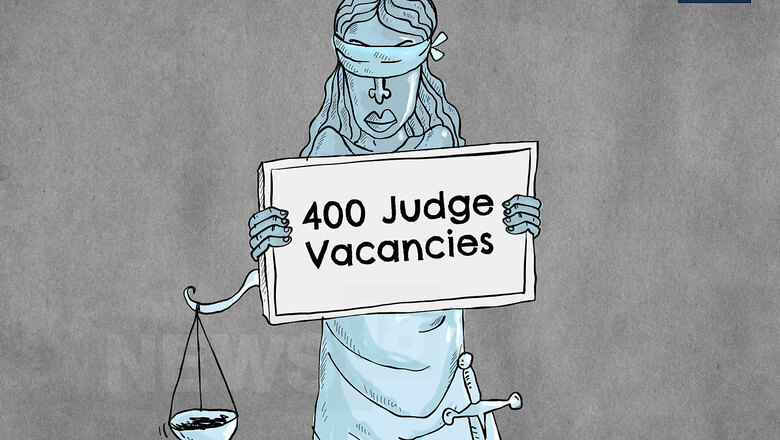
views
New Delhi: At a time when lawyers are resorting to strikes to protest against judicial vacancies in the High Courts, the latest data from Ministry of Law and Justice pegged the total judicial vacancies across various High Courts and the Supreme Court to be at a staggering 410.
According to the data, out of the total 1079 posts available for the judges 410 are vacant. This includes 232 permanent vacancies and 117 vacancies for additional judges.
Till last month, the 24 high courts in the country had a working strength of 673 judges with total 406 vacant positions.
Allahabad High Court currently tops the list of vacancies with 60 positions vacant. The total working strength of the court is 160 with only 100 working currently.
However, Sikkim has a different story to tell. With approved strength of three, it fills all three.
The Karnataka High Court though is caught in a peculiar situation with the Central government overruling the Collegium’s decision to appoint a judge at the court.
The stand-off between the judiciary and executive over the appointment of district and sessions judge Krishna Bhat to the Karnataka HC bench deepened with the Chief Justice deciding to close the ongoing probe against him.
However, Justice Jasti Chelameswar, second senior-most judge of the SC and a member of the SC collegium, recently expressed his displeasure with regard to this.
"If the government finds a problem with a Collegium recommendation then issue needs to be raised with the Collegium and not the Chief Justice of that High Court," Justice Chelameswar, said at a Harvard discussion event recently.
This latest data show that Karnataka HC has an approved strength of 62 judges with only 30 working judges thus creating a vacancy of 32 judge positions.
According to the latest data, even the apex court has to fill seven vacant positions till it has a full house of justices.
It has also been noted that nine out of 24 states have acting Chief Justices. They are Telangana and Andhra Pradesh, Bombay, Calcutta, Delhi, Himachal Pradesh, Jammu and Kashmir, Jharkhand, Manipur and Meghalaya.
The situation remains similar even with the appointment of judges in Subordinate and district courts.
Union Law Minister, Ravi Shankar Prasad had recently said, “As per the constitutional framework, the selection and appointment of judges in subordinate courts is the responsibility of the High Courts and state governments. In so far as recruitment of judicial officers in the states is concerned, the respective high courts do it in certain states, whereas the high courts do it in consultation with the State Public Service Commissions in other states.”
The government recently also notified the appointment of Justice Ramalingam Sudhakar as the acting chief justice of the J&K high court. Justice Sudhakar is the senior-most judge of the J&K HC.
According to law ministry, five additional judges were made permanent in Kerala HC; four in the Allahabad HC; 10 in the Rajasthan HC; six in the Bombay HC; seven in the Gujarat HC and one in the Gauhati HC.

















Comments
0 comment